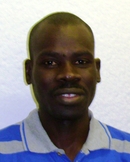Contact
Email:
herraliali@yahoo.fr
Dr. Ali Alhadji was a PhD Candidate at the Research Training Group from 2013 to 2017. He finished and defended his dissertation in summer 2017. As from 2017/2018 he works as Coordinator of German as a Foreign Language and is Senior Lecturer atthe Higher Teachers’ Training College in Maroua, Cameroon.
Dissertation Abstract
Migrants' Literature and Strategies of Self-Positioning: A Comparative Study of Rafik Schami, Jusuf Naoum and Amin Maalouf
"National literature is now a rather unmeaning term; the epoch of world literature is at hand, and everyone must strive to hasten its approach". Close to two centuries after Goethe’s epoch-making sentence, the nation still remains a central category in the reception of literature. Expressions such as "migrant literature", "francophone literatures", and "Commonwealth literature" testify to the literary nationalism in the West. In fact, they have been created to distinguish between national and foreign literature and, thus, perpetuating at the same time the core-periphery model.
This research project deals with three authors whose biographies and writing techniques challenge this literary nationalism in Germany and France. It aims at analyzing the strategies developed by Lebanese writers Jusuf Naoum and Amin Maalouf as well as Syrian born author Rafik Schami to inscribe themselves into the literary fields of their host countries and to accumulate symbolic capital. It also seeks to find out the influence of their respective social and cultural capital both on the production and the reception of their works written in the languages of their respective host countries (German for Schami and Naoum, and French for Maalouf). Crucial for this project is also the question of language: it is important to question what it means for an Arab to produce literary works in German or in French instead of using their mother tongue. This will necessarily lead to a comparison of the structure and functioning of two European literary fields and to finding the place reserved for migrants' literature in each of them.
Publications
"Jusuf Naoums Kaffeehausgeschichten: ein neues Genre in der deutschen Literaturlandschaft?". In: Metin Toprak, Ali Osman Öztürk (eds.): Migration und kulturelle Diversität. Tagungsbeiträge des XII. Türkischen Internationalen Germanistik Kongresses. Bd. I: Literatur- und Übersetzungswissenschaft, Frankfurt a. M.: Lang, 2015, S. 147-158.
"Des littératures de ghetto? Quelques remarques à propos de la situation des 'écrivains venus d'ailleurs' en Allemagne et en France". In: David Simo (ed.): Pratiques herméneutiques interculturelles. Mélanges en hommage à Alioune Sow, Yaoundé: Éditions CLE, 2015, S. 139-154.
"Enzensberger, Fanon, Nirumand: Zur 'politischen Alphabetisierung' Deutschlands in den sechziger Jahren". In: Kaliao. Revue pluridisciplinaire de l'Ecole Normale Supérieure de Maroua (Cameroun), Série Lettres et Sciences Humaines, 3.6 (2011), S. 191-217.
"Wider den Kulturenkampf. Goethe- und Canetti-Rezeption in Fawzi Boubias Heidelberg-Marrakesch, einfach". In: Constantin Sonkwé Tayim, Hyacinthe Ondoa und Jean-Bertrand Miguoué (eds.): Postkoloniale Blickpunkte: Betrachtungen der Interkulturalität in Literatur, Film und Sprache. Festschrift für David Simo zum 65. Geburtstag, Leipzig: Leipziger Universitätsverlag, 2017, S. 25-39.


